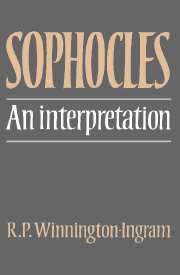Book contents
- Frontmatter
- Contents
- Preface
- Bibliography of short titles
- 1 Introductory
- 2 The mind of Ajax
- 3 The burial of Ajax
- 4 Trachiniae
- 5 Sophocles and the irrational: three odes in Antigone
- 6 Creon and Antigone
- 7 Fate in Sophocles
- 8 The fall of Oedipus
- 9 Furies in Sophocles
- 10 Electra
- 11 Oedipus at Colonus
- 12 Philoctetes
- 13 Heroes and gods
- Appendices
- A The Parodos of Trachiniae
- B Trachiniae 248ff.
- C Prometheus Vinctus 511–20
- D The Parodos of Electra
- E Locality in Oedipus Coloneus
- F Philoctetes 419ff.
- G The chronology of the plays
- Select index
G - The chronology of the plays
Published online by Cambridge University Press: 07 December 2009
- Frontmatter
- Contents
- Preface
- Bibliography of short titles
- 1 Introductory
- 2 The mind of Ajax
- 3 The burial of Ajax
- 4 Trachiniae
- 5 Sophocles and the irrational: three odes in Antigone
- 6 Creon and Antigone
- 7 Fate in Sophocles
- 8 The fall of Oedipus
- 9 Furies in Sophocles
- 10 Electra
- 11 Oedipus at Colonus
- 12 Philoctetes
- 13 Heroes and gods
- Appendices
- A The Parodos of Trachiniae
- B Trachiniae 248ff.
- C Prometheus Vinctus 511–20
- D The Parodos of Electra
- E Locality in Oedipus Coloneus
- F Philoctetes 419ff.
- G The chronology of the plays
- Select index
Summary
Of the seven extant plays two only have firm production-dates: Philoctetes was produced in 409, Oedipus Coloneus (posthumously) in 401. Antigone is said to have been responsible for Sophocles' election as general in 440, which, true or false, would not have been said unless the play was known to have been produced shortly before that date. The chronology of the four remaining plays is disputed. The following notes aim only to set out, without much argument, the assumptions made in the foregoing discussions. For fuller treatment of these complex matters the reader is referred to standard editions of the plays, to Lesky, TD, and to specialized monographs, some of which are mentioned below.
Ajax. This has often been assumed, on inconclusive grounds, to be the earliest extant play. There are, however, stylistic and technical reasons for placing it relatively early. I say relatively, since Sophocles first produced in 468, and there is no good ground for supposing that any of the extant plays belongs to the earliest period of his work.
Trachiniae. The dating is highly controversial, but recent opinion concurs in placing it early rather than late, cf. Kamerbeek 27–9; Lesky, TD 118–20; Johansen, Lustrum 257f.; Segal, YCS 103 n. 18. ‘Der Bau des Stückes schliesst eine Spätdatierung aus’ (Lesky); and one may observe the collocation of long speeches, with little or no dialogue, in the centre of this play (749–812, 899–946, 1046–1111) as of Ajax (646–92, 748–83, 815–65). Metrical evidence also seems to exclude a late dating dating.
- Type
- Chapter
- Information
- Sophocles: An Interpretation , pp. 341 - 344Publisher: Cambridge University PressPrint publication year: 1980



